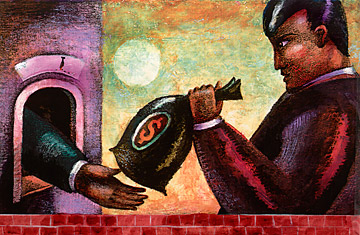
Washington has spent much of this year showing how tough it is on tax cheats. The Justice Department triumphantly declared in August that it had reached a settlement with Swiss banking giant UBS for it to turn over the names of approximately 4,450 American account holders suspected by the IRS of evading taxes. This week, the IRS revealed the formation of a special task force to go after wealthy tax dodgers, and members of Congress introduced a bill to force foreign firms doing business in the U.S. to disclose all its U.S. clients with accounts overseas.
But for all the bluster about cracking down on Americans who hide money overseas, the U.S. turns a virtual blind eye to foreign tax cheats who are parking money in the U.S. banking system. In particular, the U.S. effectively serves the role of Switzerland for Mexico, which suffers from rampant tax evasion — rates go as high as 70% among professionals and small businesses, and 40% among larger businesses. Much of the estimated $42 billion a year of illicit funds flowing out of Mexico each year (not including drug cartel money) ends up in U.S. banks, according to Global Financial Integrity, an advocacy group in Washington. Soon after the Obama Administration took office, Mexico sent Treasury Secretary Tim Geithner a letter complaining about the de facto secrecy U.S. banks offer Mexicans holding accounts by not reporting to anyone the names or interest income paid on those deposits. "The exchange of information on interest paid by banks will certainly provide us with a powerful tool to detect, prevent and control tax evasion, money laundering, terrorist financing, drug trafficking and organized crime," said the Feb. 9 letter from Mexican Finance Secretary Agustin Carstens, who also noted that the two countries do not have a "solid and reliable mechanism to verify actual residence of the foreign depositors."
"Replace the nationalities mentioned in the letter, and you've replicated the UBS affair point for point," says Robert Goulder, international editor in chief at Tax Analysts, a nonprofit publisher about taxes worldwide, which first reported on the Carstens letter. "If you are a Mexican drug lord, you can put as much money as you want into U.S. banks. We ain't going to tax it, and the Mexicans can't tax it because they are never going to know about it. It's the financial equivalent of 'Don't ask, don't tell.' "
It's not that the U.S. has no policies in place to stem the flow of illicit monies into the U.S. banking system. American banks are in fact required to file suspicious activity reports (SARs) for cash deposits over $10,000 or when they detect deposit patterns in lower amounts, known as "structuring." The problem is that the U.S. government is overwhelmed by more than a million of these reports a year. Computers can detect some irregularities, but these need to be combed through carefully by 85 SAR review teams — combining FBI, IRS, DEA and U.S. Attorneys — across the country. That's why, says international white collar crime lawyer Bruce Zagaris, "U.S. officials have practically begged banks to call them when they have something really good."
This could change significantly with a seemingly simple regulatory adjustment, which Mexico has requested: they want the same information-exchange arrangement that Washington exclusively has with Canada, which automatically reports interest income paid by U.S. banks to Canadian account holders. "Being the world's largest trading block under the NAFTA, and fighting considerably the higher security threat than a decade ago, I truly believe that we should enhance our cooperation and strengthen our capacities to protect our peoples and wealth," Carstens wrote in his letter.
Of course, when there are hundreds of billions of dollars at stake, nothing is ever that simple. For the U.S., an agreement with Mexico does not offer any clear, immediate upside. Very few Americans hide their money in Mexican banks. And the banking lobby is vigorously opposed to it, especially among banks with huge foreign deposits in Florida, California, Texas and New York. The Florida International Banking Association, in a report put out at the beginning of the decade, warned that a policy change could prompt from one-third to more than one-half of the roughly $50 billion its members hold in foreign deposits to flee to Panama and other offshore locations. Annual average job losses in the state as a result were estimated at from 41,000 to 78,000 over 15 years, with lost business operating revenues ranging from $4.4 billion to $8.36 billion annually. That study was prepared the last time the U.S. government considered changing the regulation, which occurred in the final days of the Clinton Administration. Florida's then governor, Jeb Bush, was reportedly instrumental in snuffing out the proposal soon after his brother took up residence in the White House.
Officials from both countries say they are working on the issue, but no decision has been made. Some observers think there is a reasonably good chance that the Treasury will agree to Mexico's request — deputy assistant secretary for international tax policy Stephen Shay (who just joined in August) is known to be sympathetic. Still, as clear as U.S. national-security interests are in working closer with Mexico on stopping the flow of illicit funds, especially from its drug cartels, giving in on the issue could prove a slippery slope. Authorities in other foreign countries that are big sources of illicit funds into the U.S., such as Venezuela and Russia, would likely want the same treatment. Then again, if Washington wants to effectively crack down on its own wealthy tax cheats, it is going to have to sacrifice some of its bank secrecy to get others to do the same.
